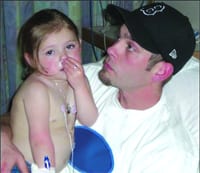Close Comforts Baystate VNA Offers Support and Expertise to Children with Life-limiting Conditions
Carol Rodrigues, hospice director for Baystate Visiting Nurses Assoc. and Hospice in Springfield, has heard more than her share of heartbreaking stories, but also some wonderful ones.
She recalls the cadre of ‘secret Santas’ who set out just before the holidays to buy Christmas presents for families caring for children with life-limiting illnesses, and the Spanish-speaking volunteer who became a young mother’s shadow, translating complicated medical jargon associated with her child’s health, and often offering her rides to and from the hospital.
And then there’s the story of a little girl who could not communicate her fear of dying, until the VNA sent a puppeteer to her home. Then, she was finally able share her feelings by talking with — and through — the puppet.
These stories and countless others, said Rodrigues, were born from the VNA’s new concentration on providing palliative care — treatment to relieve symptoms, paired with supportive services — to children with life-limiting illnesses and their families, and on educating a greater number of people on both the availability and importance of such services.
The State of Affairs
Rodrigues explained that the Pediatric Palliative Care Program, now in its second year, is a project that she and other palliative care professionals across the Commonwealth have been working toward for several years, through the Hospice and Palliative Care Federation of Mass.
By working closely with the Department of Public Health and the state Senate, Rodrigues and her fellow members of the Hospice and Palliative Care Federation brought the three-year grant program to fruition with a $900,000 budget. Since it was introduced at the start of 2007, various VNAs, hospices, and other facilities have added new pediatric palliative services through a grant-application process.
Rodrigues said the driving force behind the federation’s work is the children who sometimes fall through the palliative and hospice care cracks due to various regulations on the state level.
“There are children in this state who are ineligible for hospice services if they’re receiving any other kind of care, like block nursing,” she said, referring to the nursing service often provided to children with chronic issues.
“For instance, a child who’s had a tracheotomy may have a nurse who stays with him all day long, but he can’t have palliative care as well — the state calls it double dipping.”
Through the Pediatric Palliative Care Program, families can avoid canceling other services, and do not have to pay to receive care.
Hope and Help
Beyond red tape, however, there’s another important consideration regarding the care of children with life-limiting conditions that Rodrigues said is a key reason why palliative care exists.
It differs from hospice care in that there is no requirement for a six-month prognosis and curative treatments often continue, and these are important distinctions, especially for parents of sick children.
“Parents are never ready to give up on their children,” she explained. “But at the same time, many children are not getting the services they deserve, and their families aren’t being served, either.”
As such, palliative services are geared toward assisting families with children who are living with a wide range of conditions that are often chronic and could limit life expectancy, such as advanced or progressive cancer; major organ failures; HIV; cystic fibrosis; progressive genetic, neurological, or metabolic disorders; renal failure; or cerebral palsy, among other illnesses.
“A patient doesn’t need to be terminal,” said Rodrigues, “which is why we use the term ‘life-limiting.’ Many are chronic, but not dying, yet still need symptom management. Many are discharged and get better. Others transfer over to a hospice program.”
Baystate VNA, which provides palliative and hospice services in Hampden, Hampshire, and Franklin counties, was one of 10 health care organizations to receive funding — a $55,000 startup grant that can be augmented by additional funds within the three-year period. Through the grant, Baystate VNA has begun offering a wide range of services to about 10 families in the region, including not only specialized medical care, but support services, and even light housekeeping.
That wide range, Rodrigues said, is designed to offer help where help is needed, regardless of the task.
“Some families are receiving nursing with the special expertise of end-of-life symptom management, and others are working with volunteers who might do the laundry, or take care of a family’s other children for a day,” she explained.
There’s a lot of work with social workers and a lot of work with other siblings — a family is often so tied up with caring for a child who’s ill that this has become an important service.”
Consultations for pain and symptom management, assessment and case management, emergency services, and social services are also offered through the program, as well as spiritual care, respite care, and bereavement care for family members.
“Some families are doing well on their own, and with others, we’re quite involved,” she said.
Ready to Assist
Moving forward, Rodrigues said Baystate VNA will continue to market the program to physicians and other health care professionals, who can refer families to the program.
“We still need to help people understand that palliative care is there,” she said. “It’s a fairly new service in the area, but it’s one that is allowing patients to consciously make decisions on their own, and healing families.”


